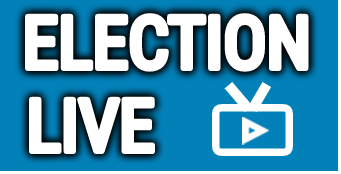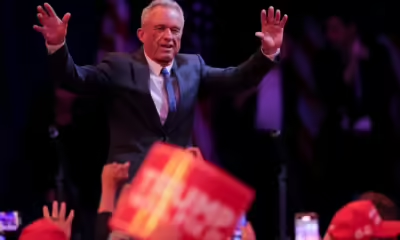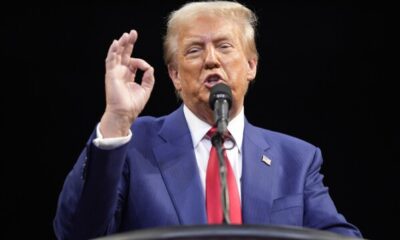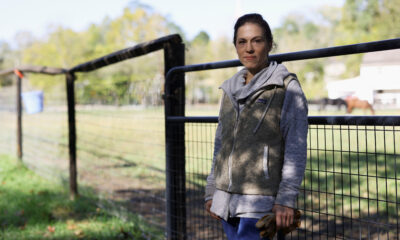AP
This could have been a year of a federal court reckoning for Trump. Judges had other ideas
Published
6 months agoon
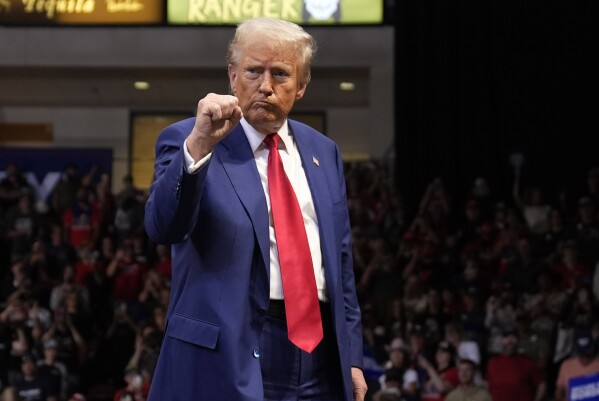
https://imasdk.googleapis.com/js/core/bridge3.672.0_en.html#goog_1170448562
0 seconds of 1 minute, 30 secondsVolume 90%
1 of 3 |
Donald John Trump is known as a real estate mogul, reality television star, the 45th president of the United States, and the Republican presidential nominee for the 2024 election.Read More
2 of 3 |
Republican presidential nominee former President Donald Trump gestures at a campaign rally at the Findlay Toyota Arena Sunday, Oct. 13, 2024, in Prescott Valley, Ariz. (AP Photo/Evan Vucci)
3 of 3 |
Republican presidential nominee former President Donald Trump speaks at a campaign rally at the Findlay Toyota Arena Sunday, Oct. 13, 2024, in Prescott Valley, Ariz. (AP Photo/Evan Vucci)
BY ERIC TUCKER AND ALANNA DURKIN RICHERUpdated 12:48 AM GMT+6, October 15, 2024Share
WASHINGTON (AP) — The indictment charging Donald Trump with hoarding classified documents leveled one jaw-dropping allegation after another, including that he showed off a secret Pentagon attack plan to guests at his golf club and suggested his lawyer mislead the FBI about the presence of the White House records.
But those details proved beside the point to the Trump-appointed judge presiding over the prosecution, who dismissed the case on grounds that the special counsel who brought it was unlawfully put in the job.
A separate criminal case accusing Trump of conspiring to overturn the outcome of the 2020 election seemed an opportunity for a trial this year focused on Trump’s failed effort to retain power after his loss to Democrat Joe Biden.
But the Supreme Court erased that possibility with an opinion that granted former presidents expansive immunity from prosecution.
A year that began with the prospect of a federal court reckoning for Trump will end without any chance of a trial, leaving voters without the finality of an up-or-down jury verdict in the two most consequential cases against the Republican presidential nominee. Yet both cases still loom over the election, their potential resurgence in the coming months making clear that at stake on Nov. 5 is not only the presidency but also possibly Trump’s liberty.
If Trump loses to Democrat Kamala Harris, he is at risk of trial and possible conviction in the classified documents case, assuming a federal appeals court revives it, or in the election interference case, where prosecutors issued a new indictment after the Supreme Court’s immunity opinion.
If Trump wins the White House, his attorney general could end both cases, and an already delayed sentencing in his state hush money case in New York — his only prosecution to reach a jury and end with a conviction — will be in even further flux.
That neither federal case made it to trial despite being brought well over a year ago highlights the complexities of prosecuting a former president and represents a vindication of sorts of the Trump team’s strategy of delay. It’s also a reflection of the immense hurdles prosecutors encountered before Republican-appointed judges, some of them selected by Trump, who in one case articulated a hugely expansive and novel view of presidential power and in the other appeared deeply skeptical of the prosecution’s premise well before derailing it.
“The reality is that efforts to hold the former president legally accountable (before the election), independent of the realm of politics, have failed in a wide variety of venues for a wide variety of reasons,” said Temple University law professor Craig Green.
“And what that means is it’s up to the American people” — not the courts — “what they have in mind for their future president.”
The Florida dismissal
The dismissal of the classified documents indictment was especially stunning because the case was seen inside the Justice Department and by legal experts as the most legally straightforward of the Trump prosecutions. Unlike the election interference case, it concerned behavior that occurred after Trump had left office in January 2021 and for which federal prosecutions are routine.
The outcome followed nearly two years of tensions between prosecutors and Aileen Cannon, a federal judge in Fort Pierce, Florida, with scant trial experience whose relationship with special counsel Jack Smith’s team had long ago soured and whose willingness to entertain all manner of motions by Trump’s defense lawyers had snarled the case before its eventual dismissal.
An indication of just how far afield the case had strayed from core factual issues was evident during a June hearing where Cannon occupied herself with the so-called Reno Regulations, the Ethics in Government Act and an esoteric legal principle, the “de facto officer doctrine.”
By day’s end, the government’s simmering exasperation had boiled over, with prosecutor David Harbach complaining that because of Cannon’s persistent questions, he’d been able to make only one of his points.
“Mr. Harbach,” she snapped. “I don’t appreciate your tone. I think we’ve been here before, and I would expect decorum in this courtroom at all times.”
The hearing ended without a ruling.
But three weeks later, and two days after Trump survived an assassination attempt at a campaign rally in Pennsylvania, Cannon dismissed the case. Siding with Trump’s arguments, she ruled that Smith had been appointed illegally by Attorney General Merrick Garland and should have been subject to confirmation by the Senate. Smith appealed, calling Cannon’s ruling contrary to decades of precedent.
It’s unclear how long it will take for the appeal to resolve, but if Cannon’s opinion is overturned and Trump loses the election, prosecutors would be able to resurrect compelling evidence accrued during the investigation.
That includes an audio recording of Trump boasting of a sensitive document he said he knew was classified and security camera footage showing boxes of records being moved from a storage room at Mar-a-Lago, his Florida home, days before investigators came to collect documents. When that June 2022 visit occurred, a Trump lawyer handed over a single folder even though boxes of files remained at the property.
That August, the FBI recovered 11 sets of classified documents during a search of Mar-a-Lago, an action that followed heated disagreements between FBI and Justice Department officials focused less on the strength of the evidence and more on whether it was the appropriate investigative step.
Trump has maintained he did nothing wrong by retaining records from his presidency.
The investigation was far along by the time Smith, a war crimes prosecutor in The Hague and a known commodity inside the Justice Department who’d been brought in more than a decade earlier to lead its public corruption section, was appointed by Garland in November 2022.
Once on the job, Smith took steps to press the case toward indictment — his team successfully argued before a federal appeals court to secure grand jury testimony from a lead Trump lawyer, M. Evan Corcoran, whose cooperation Trump had sought to block by invoking attorney-client privilege.
Though Trump’s legal peril had long been clear, one late surprise surfaced when prosecutors began presenting evidence to a grand jury in Florida — rather than the one in Washington they’d been using — to obtain the indictment. After all, the documents were found in Florida and indicting the case there would avert a court fight over proper venue.
The decision carried significant risk.
Before the indictment was unsealed, word came that the case had been assigned — randomly, the court clerk said — to Cannon.
It was an unwelcome development for a Justice Department that had tangled with her a year earlier when she ruled in favor of Trump’s request for an independent arbiter to review the records seized by the FBI. That order was overturned by a unanimous federal appeals panel after prosecutors vigorously objected.
The fraught dynamic resumed where it had left off as prosecutors’ desire for a trial collided with Cannon’s deliberative, often quixotic, style that permitted drawn-out disputes on seemingly peripheral motions and produced flashes of exasperation.
When Cannon initially permitted the defense to file a motion that would include names of government witnesses, prosecutors implored her to reconsider, citing what they said were security risks. (She later agreed to have the witness names redacted). When she asked the two sides to formulate jury instructions, prosecutors complained she had articulated a “fundamentally flawed” premise of the case.
Under her watch, long-shot defense requests lingered for months, causing delays that led her to indefinitely postpone the trial date. She held a hearing on Trump’s legally questionable claim that he was permitted under the Presidential Records Act to take the files to Mar-a-Lago, and agreed before dismissing the case to revisit a different judge’s order that gave prosecutors access to Corcoran, Trump’s lawyer.
Smith’s team had hoped for a trial that could have started months ago. Instead, prosecutors found themselves before Cannon for a multiday hearing in June over Smith’s appointment, where Harbach lamented that defense lawyers had been permitted to “hijack” the proceedings with what he said were frivolous arguments.
Days later, Trump’s lawyers got an unexpected lift from the Supreme Court immunity ruling, which included a concurring opinion from Justice Clarence Thomas backing their position that Smith’s appointment was illegal.
Just like that, an argument that to many legal experts seemed dubious had an endorsement from a member of the nation’s highest court.
Even as frustrations mounted, department officials never sought Cannon’s removal from the case, a low-probability request that likely would have exacerbated relations had it failed. They did not do so even when they told the Atlanta-based 11th U.S. Circuit Court of Appeals in August that her order dismissing the case relied on a “nonsensical” analysis.
The appeal is pending before that court, which has the option to reassign the case if it reverses Cannon’s ruling.
The Washington delay
Late last year, the judge overseeing Trump’s election interference case was pushing toward trial.
With an eye toward a March 2024 date, U.S. District Judge Tanya Chutkan planned to summon District of Columbia residents to complete a questionnaire, a step toward winnowing the potential juror pool. Officials braced for a crush of reporters covering the historic trial.
It screeched to a halt in December.
From the start, allegations that Trump broke the law through actions he took in the White House seemed destined for a protracted court fight testing the limits of presidential power. So it was hardly surprising when Trump’s lawyers demanded the case’s dismissal, arguing he enjoyed absolute immunity from prosecution.
Chutkan, who was nominated by Democratic President Barack Obama, rejected the argument with a December ruling that said the office of the president “does not confer a lifelong ‘get-out-of-jail-free’ pass.”
But crucially, she put the case on hold to give Trump time to appeal to Washington’s federal appeals court and ultimately the Supreme Court.
It would be nearly a year from the time the case was frozen before it was back in Chutkan’s courtroom. By then, the indictment was slimmed down, and it wasn’t clear when — if ever — there would be a trial.
The investigation into the attack on the Capitol on Jan. 6, 2021 — which has become the largest in Justice Department history — had consumed agents and prosecutors by the time Garland was sworn in as attorney general two months later.
Prosecutors had begun charging rioters through a bottom-up investigative strategy heavily focused on the most violent offenders who attacked police and far-right militia group members who were suspected of planning and coordination. Another investigative effort searching for financial ties between the rioters and Trump allies ultimately hit a dead end.
One year into the investigation, Garland defended the department’s deliberate pace as pressure mounted for the Justice Department to hold accountable more than just those who stormed the seat of American democracy.
“The Justice Department remains committed to holding all January 6th perpetrators, at any level, accountable under law — whether they were present that day or were otherwise criminally responsible for the assault on our democracy,” Garland said at the time. “We will follow the facts wherever they lead.”
The facts led squarely to Trump, according to a conspiracy and obstruction indictment filed nearly nine months after Smith’s appointment. Trump, for his part, has repeatedly maintained that he was entitled to challenge an election that he still insists was stolen even though judges and his own attorney general concluded otherwise.
The Trump team’s pursuit of immunity claims, which Chutkan swatted away without a hearing, snarled the case before it could ever develop.
Without ever explicitly mentioning the 2024 election, Smith’s team in December asked the Supreme Court to leapfrog Washington’s federal appeals court and rule quickly on whether Trump could be prosecuted. Acknowledging the “extraordinary request,” Smith’s team called it “an extraordinary case.” Trump’s campaign accused Smith of trying to rush to trial for political purposes.
After the Supreme Court denied Smith’s request to immediately take up the case, the federal appeals court heard arguments and joined Chutkan in turning aside the immunity claims. It would be another two months before the Supreme Court, in late April, said it was prepared to consider the case.
During arguments , several conservative justices indicated they were prepared to limit when former presidents might be prosecuted.
“This case has huge implications for the presidency, for the future of the presidency, for the future of the country,” said Justice Brett Kavanaugh. The court, added Justice Neil Gorsuch, is writing a decision “for the ages.” Both were nominated by Trump.
The Supreme Court moved quickly in prior cases involving presidents, deciding the 1974 Watergate tapes case against Republican President Richard Nixon just 16 days after arguments. In Trump’s case, the justices issued their ruling on July 1, the last day of their term and more than nine weeks after arguments.
The decision held that Trump was absolutely immune from prosecution for acts involving core constitutional functions — in the process, stripping from the indictment Trump’s dealings with the Justice Department — and at least presumptively immune for other official actions. The court also reaffirmed that no immunity exists for a president’s private acts, like those taken as a candidate.
But the justices didn’t spell out which allegations Trump could be prosecuted for, leaving it to Chutkan to decide. Smith subsequently filed a new indictment removing references to allegations prosecutors believed could be considered official acts.
Among the acts in legal limbo is Trump’s badgering of his vice president, Mike Pence, to refuse to certify the electoral results. Pence became an important witness for Smith’s team after prosecutors secured court approval to enforce a subpoena for his grand jury testimony. It was a key courtroom victory given his proximity to the then-president and the fact that Pence took contemporaneous notes of conversations with Trump.
With prosecutors and Trump’s lawyers back in her courtroom for the first time this year, Chutkan vowed in September that the election would not affect how she proceeded. She acknowledged that whatever she decided would be appealed again, likely to the Supreme Court.
That means a trial, if it happens at all, could be a year or more away.
“There’s no rush to judgment here,” Chutkan said.
The path forward
The classified documents case remains frozen unless an appeals court resurrects it.
That’s in contrast to the election interference case, where, in an effort to persuade Chutkan that the case should proceed, prosecutors submitted a 165-page brief featuring revelations about the alleged conspiracy.
In one example, the filing unsealed this month quotes Trump as saying “the details don’t matter” when he was told that bogus election fraud claims would not stand up in court. And it says he responded with “So what?” when informed that Pence was in potential peril at the Capitol on Jan. 6.
No matter what happens, the cases’ topsy-turvy trajectory provides further proof that accountability for a president — whether through an impeachment process or criminal case — is never guaranteed, said Princeton University presidential historian Julian Zelizer.
The public is “counting on elected presidents to follow certain legal guardrails.” But, he added, “holding them accountable is not very easy at all.”
Tucker covers national security in Washington for The Associated Press, with a focus on the FBI and Justice Department and the special counsel cases against former President Donald Trump.
You may like
AP
The final day of voting in the US is here, after tens of millions have already cast their ballots
Published
6 months agoon
November 5, 2024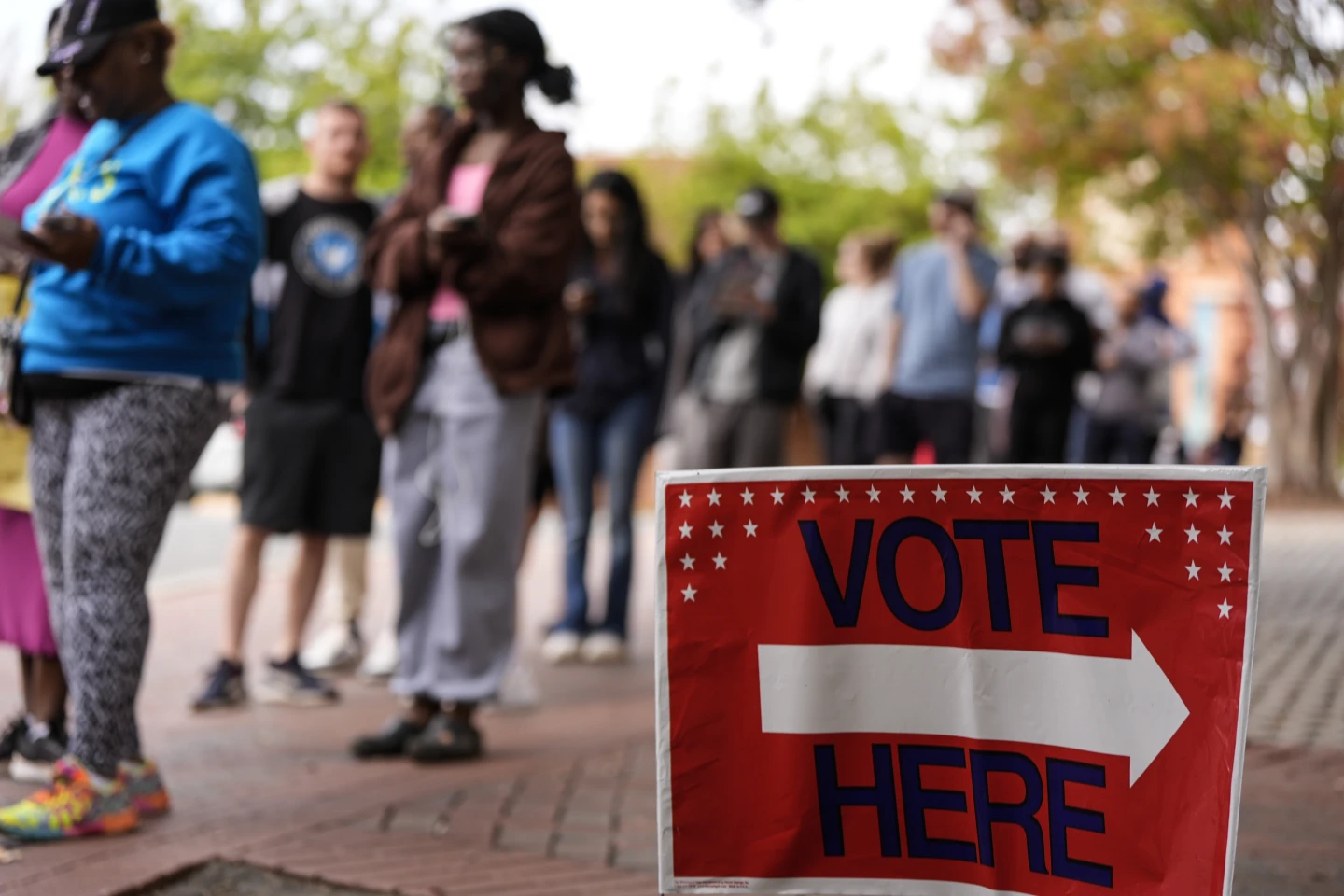
1 of 10 |
People stand in line during the last day of early voting, Saturday, Nov. 2, 2024, in Charlotte, N.C. (AP Photo/Mike Stewart)Read More
2 of 10 |
Voters line up to vote as a early voting location opened in Carmel, Ind., Wednesday, Oct. 23, 2024. (AP Photo/Michael Conroy)
3 of 10 |
A person walks past a sign during early voting in the general election, Friday, Nov. 1, 2024, in Fall River, Mass. (AP Photo/Steven Senne)
4 of 10 |
An election worker demonstrates mail-in ballot processing during a media preview at the Philadelphia Election Warehouse, in Philadelphia, Friday, Oct. 25, 2024. (AP Photo/Matt Rourke)
5 of 10 |
A voter fills out their their ballot during early voting in the general election, Friday, Nov. 1, 2024, in Fall River, Mass. (AP Photo/Steven Senne)
6 of 10 |
People line up to vote at the Chicago Early Voting Loop Supersite in Chicago, Thursday, Oct. 24, 2024. (AP Photo/Nam Y. Huh)
7 of 10 |
Bennett College student Zairen Jackson listens to a fellow student answer a question during a roundtable in Greensboro, N.C., Tuesday, Oct. 8, 2024. (AP Photo/Chuck Burton)
8 of 10 |
FILE – A Delaware County secured drop box for the return of vote-by-mail ballots is pictured, May 2, 2022, in Newtown Square, Pa. (AP Photo/Matt Rourke, File)
9 of 10 |
An elections official sorts counted mail-in ballots on the first day of tabulation, Wednesday, Oct. 23, 2024, at the Maricopa County Recorder’s Office in Phoenix. (AP Photo/Matt York)
10 of 10 |
People wait in line to cast their ballots at an early voting location, Thursday, Oct. 31, 2024, in Blue Springs, Mo. (AP Photo/Charlie Riedel)
BY CHRISTINA A. CASSIDY AND ALI SWENSONUpdated 11:05 AM GMT+6, November 5, 2024
WASHINGTON (AP) — Election Day 2024 arrived Tuesday — with tens of millions of Americans having already cast their ballots. Those include record numbers in Georgia, North Carolina and other battleground states that could decide the winner.
The early turnout in Georgia, which has flipped between the Republican and Democratic nominees in the previous two presidential elections, has been so robust — over 4 million voters — that a top official in the secretary of state’s office said the big day could look like a “ghost town” at the polls.
As of Monday, Associated Press tracking of advance voting nationwide showed roughly 82 million ballots already cast — slightly more than half the total number of votes in the presidential election four years earlier. That’s driven partly by Republican voters, who were casting early ballots at a higher rate than in recent previous elections after a campaign by former President Donald Trump and the Republican National Committee to counter the Democrats’ longstanding advantage in the early vote.
That included in the parts of western North Carolina hammered last month by Hurricane Helene. State and local election officials, benefiting from changes made by the Republican-controlled legislature, pulled off a herculean effort to ensure residents could cast their ballots as they dealt with power outages, lack of water and washed out roads.
By the time early voting in North Carolina had ended on Saturday, over 4.4 million voters — or nearly 57% of all registered voters in the state — had cast their ballots. As of Monday, turnout in the 25 western counties affected by the hurricane was even stronger at 59% of registered voters, state election board Executive Director Karen Brinson Bell said.
Brinson Bell called the voters and election workers in the hurricane-hit counties “an inspiration to us all.”
Besides the hurricanes in North Carolina and Florida, the most worrisome disruptions to the election season so far were arson attacks that damaged ballots in two drop boxes near the Oregon-Washington border. Authorities there were searching for the person responsible.
The absence of any significant, widespread problems has not stopped Trump, the Republican nominee, or the RNC, which is now under his sway, from making numerous claims of fraud or election interference during the early voting period, a possible prelude to challenges after Election Day.
He has mischaracterized an investigation underway in Pennsylvania into roughly 2,500 potentially fraudulent voter registration applications by saying one of the counties was “caught with 2600 Fake Ballots and Forms, all written by the same person.” The investigation is into registration applications; there is no indication that ballots are involved.
In Georgia, Republicans sought to prohibit voters from returning mailed ballots to their local election office by the close of polls on Election Day, votes that are allowed under state law. A judge rejected their lawsuit over the weekend.
Trump and Republicans also have warned about the possibility that Democrats are recruiting masses of noncitizens to vote, a claim they have made without evidence and that runs counter to the data, including from Republican secretaries of state. Research has consistently shown that noncitizens registering to vote is rare. Any noncitizen who does faces the potential of felony charges and deportation, a significant disincentive.
One case of noncitizen voting was caught during early voting last month and resulted in felony charges in Michigan after a student from China cast an illegal early ballot.
This is the first presidential vote since Trump lost to Joe Biden four years ago and began various attempts to circumvent the outcome and remain in power. That climaxed with the violent Jan. 6, 2021, attack on the U.S. Capitol to halt certification of the results after Trump told his supporters to “fight like hell.”
Even now, a solid majority of Republicans believe Trump’s lie that Biden was not legitimately elected, despite reviews, audits and recounts in the battleground states that all affirmed Biden’s win. A survey last month from The Associated Press-NORC Center for Public Affairs Research showed Republicans remain much more skeptical than Democrats that their ballots will be counted accurately this year.
Seeking to rebuild voter confidence in a system targeted with false claims of widespread fraud, Republican lawmakers in more than a dozen states since 2020 have passed new voting restrictions. Those rules include shortening the window to apply or return a mail ballot, reducing the availability of ballot drop boxes and adding ID requirements.
On the last weekend before Election Day, Trump continued to falsely claim the election was being rigged against him and said a presidential winner should be declared on election night, before all the ballots are counted.
Vice President Kamala Harris urged voters not to fall for Trump’s tactic of casting doubt on elections. The Democratic nominee told supporters at a weekend rally in Michigan that the tactic was intended to suggest to people “that if they vote, their vote won’t matter.” Instead, she urged people who had already cast ballots to encourage their friends to do the same.
Through four years of election lies and voting-related conspiracy theories, local election officials have faced harassment and even death threats. That has prompted high turnover and led to heightened security for election offices and polling sites that includes panic buttons and bullet-proof glass.
While there have been no major reports of any malicious cyberactivity affecting election offices, foreign actors have been active in using fake social media profiles and websites to drum up partisan vitriol and disinformation. In the final weeks, U.S. intelligence officials have attributed to Russia multiple fake videos alleging election fraud in presidential swing states.
On the eve of Election Day, they issued a joint statement with federal law enforcement agencies warning that Russia in particular was ramping up its influence operations, including in ways that could incite violence, and likely would continue those efforts well after the votes have been cast.
Jen Easterly, the nation’s top election security official, urged Americans to rely on state and local election officials for information about elections.
“This is especially important as we are in an election cycle with an unprecedented amount of disinformation, including disinformation being aggressively peddled and amplified by our foreign adversaries at a greater scale than ever before,” she said. “We cannot allow our foreign adversaries to have a vote in our democracy.”
___
The Associated Press receives support from several private foundations to enhance its explanatory coverage of elections and democracy. See more about AP’s democracy initiative here. The AP is solely responsible for all content.
Swenson reports on election-related misinformation, disinformation and extremism for The Associated Press.
AP
Georgia high court says absentee ballots must be returned by Election Day, even in county with delay
Published
6 months agoon
November 5, 2024
Updated 5:13 AM GMT+6, November 5, 2024
ATLANTA (AP) — Thousands of voters in Georgia’s third-largest county who received their absentee ballots late will not get an extension to return them, the state’s highest court decided on Monday.
Cobb County, just north of Atlanta, didn’t mail out absentee ballots to some 3,400 voters who had requested them until late last week. Georgia law says absentee ballots must be received by the close of polls on Election Day. But a judge in a lower court ruled last week that the ballots at issue could be counted if they’re received by this Friday, three days after Election Day, as long as they were postmarked by Tuesday.
The Georgia Supreme Court ruling means the affected Cobb County residents must vote in person on Election Day, which is Tuesday, or bring their absentee ballots to the county elections office by 7 p.m. that day.
The high court ruling instructs county election officials to notify the affected voters by email, text message and in a public message on the county election board’s website. And it orders officials to keep separate and sealed any ballots received after the Election Day deadline but before 5 p.m. Friday.
Board of elections Chair Tori Silas said the board will comply with the Supreme Court order, but it’s still up in the air whether ballots received after Election Day will be counted. The order only addressed a motion for a stay, so election officials will have to wait for the court’s final ruling to see whether votes received after Tuesday will be counted, she said in a statement.
To deliver the ballots on time, election officials in Cobb County were using U.S. Postal Service express mail and UPS overnight delivery, and sending the ballots with prepaid express return envelopes. The Board of Elections said that more than 1,000 of the absentee ballots being mailed late were being sent to people outside of Georgia.
Silas last week blamed the delay in sending out the ballots on faulty equipment and a late surge in absentee ballot requests during the week before the Oct. 25 deadline.
The original ruling extending the deadline stemmed from a lawsuit filed by the American Civil Liberties Union and the Southern Poverty Law Center on behalf of three Cobb County voters who said they had not received absentee ballots by mail as of Friday.
AP
Elon Musk’s $1 million-a-day voter sweepstakes can proceed, a Pennsylvania judge says
Published
6 months agoon
November 5, 2024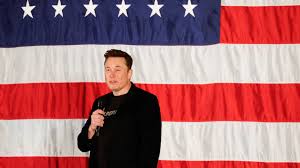
0 seconds of 1 minute, 46 secondsVolume 90%
1 of 7 |
Elon Musk is pledging to give away $1 million a day to voters for signing his political action committee’s petition backing the Constitution. The giveaway by the Donald Trump supporter is raising questions among some who say it’s a violation of the law.Read More
2 of 7 |
America PAC lawyer Chris Gober speaks with members of the media ahead of a hearing at a City Hall courtroom in Philadelphia, Monday, Nov. 4, 2024. (AP Photo/Matt Rourke)
3 of 7 |
Elon Musk speaks before Republican presidential nominee former President Donald Trump at a campaign rally at Madison Square Garden, Sunday, Oct. 27, 2024, in New York. (AP Photo/Alex Brandon)
4 of 7 |
Philadelphia District Attorney Larry Krasner arrives for a hearing at a City Hall courtroom, in Philadelphia, Monday, Nov. 4, 2024. (AP Photo/Matt Rourke)
5 of 7 |
America PAC lawyer Chris Gober speaks with members of the media ahead of a hearing at a City Hall courtroom in Philadelphia, Monday, Nov. 4, 2024. (AP Photo/Matt Rourke)
6 of 7 |
Elon Musk speaks before Republican presidential nominee former President Donald Trump at a campaign rally at Madison Square Garden, Sunday, Oct. 27, 2024, in New York. (AP Photo/Evan Vucci)
7 of 7 |
Philadelphia District Attorney Larry Krasner, third from right, arrives for a hearing at a City Hall courtroom, Thursday, Oct. 31, 2024, in Philadelphia. (AP Photo/Matt Rourke)
BY MARYCLAIRE DALEUpdated 4:19 AM GMT+6, November 5, 2024Share
Follow live: Updates from AP’s coverage of the presidential election.
PHILADELPHIA (AP) — The $1 million-a-day voter sweepstakes that Elon Musk ‘s political action committee is hosting in swing states can continue through Tuesday’s presidential election, a Pennsylvania judge ruled Monday.
Common Pleas Court Judge Angelo Foglietta — ruling after Musk’s lawyers said the winners are paid spokespeople and not chosen by chance — did not immediately explain his reasoning.
District Attorney Larry Krasner, a Democrat, had called the process a scam “designed to actually influence a national election” and asked that it be shut down.
Musk lawyer Chris Gober said the final two recipients before Tuesday’s presidential election will be in Arizona on Monday and Michigan on Tuesday.
“The $1 million recipients are not chosen by chance,” Gober said Monday. “We know exactly who will be announced as the $1 million recipient today and tomorrow.”
Chris Young, the director and treasurer of America PAC, testified that the recipients are vetted ahead of time, to “feel out their personality, (and) make sure they were someone whose values aligned” with the group.
Musk’s lawyers, defending the effort, called it “core political speech” given that participants sign a petition endorsing the U.S. Constitution. They also said Krasner’s bid to shut it down under Pennsylvania law was moot because there would be no more Pennsylvania winners before the program ends Tuesday.
Young also acknowledged that the PAC made the recipients sign nondisclosure agreements.
“They couldn’t really reveal the truth about how they got the money, right?” Summers asked.
“Sounds right,” Young said.
In an Oct. 20 social media post shown in court, Musk said anyone signing the petition had “a daily chance of winning $1M!”
Summers grilled him on Musk’s use of both the words “chance” and “randomly,” prompting Young to concede the latter was not “the word I would have selected.”
Young said the winners knew they would be called on stage but not specifically that they would win the money.
Musk did not attend the hearing. He has committed more than $70 million to the super PAC to help Trump and other Republicans win in November.
“This was all a political marketing masquerading as a lottery,” Krasner testified Monday. “That’s what it is. A grift.”
Lawyers for Musk and the PAC said they do not plan to extend the lottery beyond Tuesday. Krasner said the first three winners, starting on Oct. 19, came from Pennsylvania in the days leading up to the state’s Oct. 21 voter registration deadline.
Other winners came from the battleground states of Wisconsin, Nevada, Arizona, Georgia, North Carolina and Michigan. It’s not clear if anyone has yet received the money. The PAC pledged they would get it by Nov. 30, according to an exhibit shown in court.
More than 1 million people from the seven states have registered for the sweepstakes by signing a petition saying they support the right to free speech and to bear arms, the first two amendments to the U.S. Constitution. Krasner questioned how the PAC might use their data, which it will have on hand well past the election.
“They were scammed for their information,” Krasner said. “It has almost unlimited use.”
Krasner’s team called Musk “the heartbeat of America PAC,” and the person announcing the winners and presenting the checks.
“He was the one who presented the checks, albeit large cardboard checks. We don’t really know if there are any real checks,” Summers said.
Foglietta presided over the case at Philadelphia City Hall after Musk and the PAC lost an effort to move it to federal court.
Krasner has said he could still consider criminal charges, as he’s tasked with protecting both lotteries and the integrity of elections.
Pennsylvania remains a key battleground state with 19 electoral votes and both Trump and Democratic Vice President Kamala Harris have repeatedly visited the state, including stops planned Monday in the final hours of the campaign.
Krasner — who noted that he has long driven a Tesla — said he could also seek civil damages for the Pennsylvania registrants. Musk is the CEO and largest shareholder of Tesla. He also owns the social media platform X, where America PAC has published posts on the sweepstakes, and the rocket ship maker SpaceX.
Dale covers national legal issues for The Associated Press, often focusing on the federal judiciary, gender law, #MeToo and NFL player concussions. Her work unsealing Bill Cosby’s testimony in a decade-old deposition led to his arrest and sexual assault trials.

US election live: Latest polls show Harris, Trump tied on election eve

Elon Musk’s $1m US voter giveaway to continue, Pennsylvania judge rules

Trump or Harris? Gaza war drives many Arab and Muslim voters to Jill Stein

Joe Rogan endorses Trump on eve of the election

Trump describes US as an occupied country in dark closing message focused on immigration
Trending
-

 The Washington Post7 months ago
The Washington Post7 months agoAre you still registered to vote? How to make sure you’re up to date.
-
Debates8 months ago
Donald Trump Vs Kamala Harris LIVE | The Big 2024 Debate | U.S. Election Latest
-
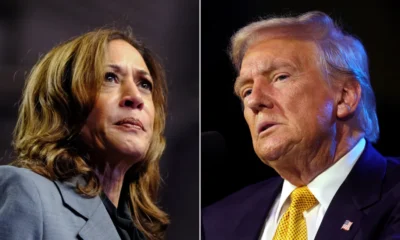
 CNN7 months ago
CNN7 months agoCNN Poll: Harris and Trump are tied in North Carolina, while vice president leads in Nebraska’s 2nd District
-

 CNN7 months ago
CNN7 months agoNew York Democrats are desperate to avoid repeat of their 2022 midterm collapse
-
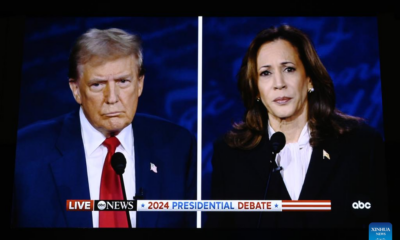
 Donald Trump8 months ago
Donald Trump8 months agoWas Harris’s debate performance enough to win over undecided voters?
-

 Kamala Harris7 months ago
Kamala Harris7 months agoExclusive: Harris to release new economic proposals this week on US wealth creation
-
Debates8 months ago
US election: Blistering exchanges and fact checking in Kamala Harris and Donald Trump debate
-

 CNN7 months ago
CNN7 months agoHarris’ cash edge funds advertising blitz as Elon Musk cuts big check to House Republicans, new filings show
